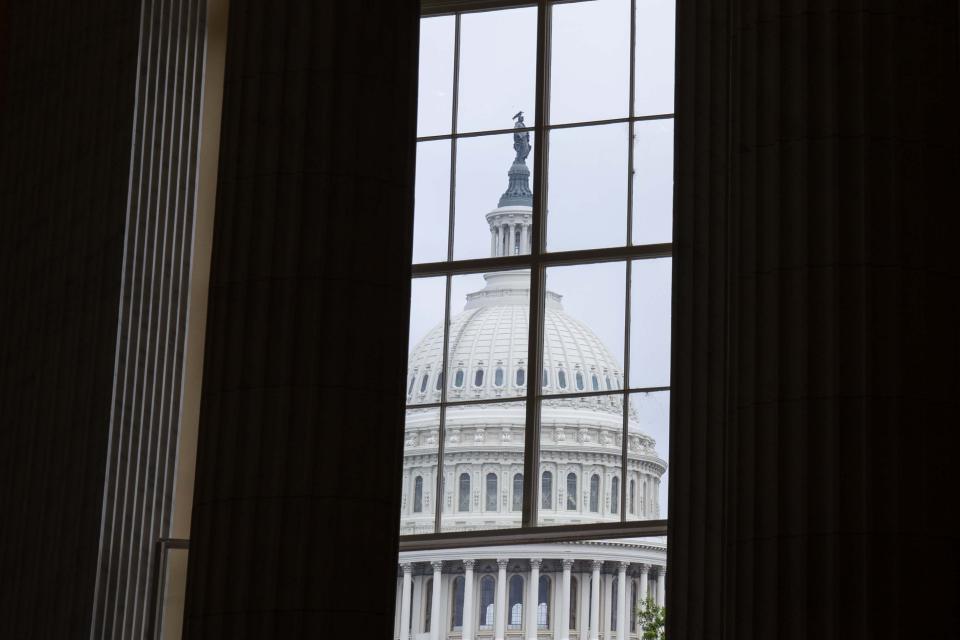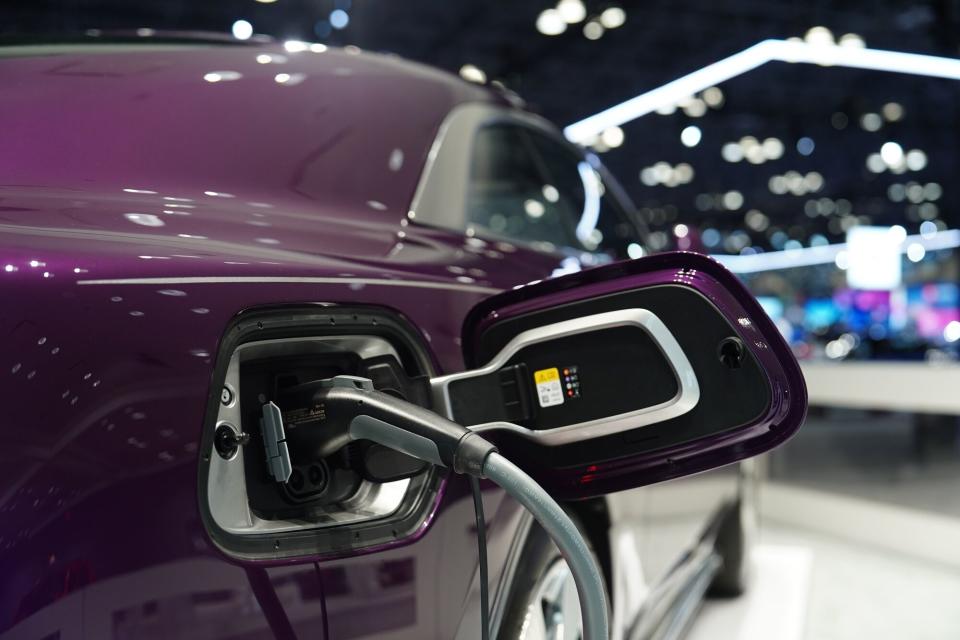Trains, Planes and TikTok: Congress Has a Lot to Do and Not Much Time
- Oops!Something went wrong.Please try again later.
- Oops!Something went wrong.Please try again later.
(Bloomberg) -- Congress has a lot left on its agenda this year, including bipartisan tax cuts that would benefit US companies with large capital expenditures and legislation to force TikTok’s Chinese parent company to sell its popular social video network.
Most Read from Bloomberg
Iran’s Better, Stealthier Drones Are Remaking Global Warfare
Germany to Order Ships, Armored Vehicles Worth Up to €7 Billion
But as the November election gets closer, the work only gets harder for a Congress riven by conflict over everything from immigration to IVF.
Long-delayed Ukraine war aid is the top priority when Congress returns to work this week after a two-week break. Here’s the outlook for other unfinished business for business.
TikTok
Delayed. The House already passed a measure to force China-based ByteDance Ltd. to divest TikTok. The White House has given its backing and so have many senators from both parties. But Senate Commerce Chair Maria Cantwell wants broader legislation that goes beyond TikTok.
Online Subsidies, Safety
Mixed. Cantwell and House Energy and Commerce Chair Cathy McMorris Rodgers announced a deal and draft legislation Sunday on a data-privacy and security standard, significantly improving the odds that Congress will act. Separately, a hotly lobbied package of bills aimed at protecting children online has languished. One measure, led by Democrat Richard Blumenthal and Republican Marsha Blackburn, has at least 64 other public supporters, more than enough to pass the Senate. Meanwhile, 23 million households are set to lose a $30 per month federal discount on internet access when funding runs out next month, though there are bipartisan efforts to extend it.
Tax Cuts
Stuck. Senate Republicans are poised to sink a bipartisan $78 billion tax cut pairing breaks for US companies with large research or capital equipment costs together with an expanded child tax credit mostly benefiting lower-income families. Some oppose the child tax credit expansion as damaging work incentives, don’t want to give Biden an election-year victory or think they can get a better deal after the election. Momentum could slow further after the April 15 tax-filing deadline, though the IRS has said it would retroactively send checks to eligible recipients.
Read more: Business, Child Tax Breaks Hit Republican Roadblock in US Senate
Railroad Safety
Slow Track. A bipartisan railroad safety bill introduced last year in the wake of the East Palestine, Ohio, rail disaster has won support from unlikely political bedfellows Donald Trump and Joe Biden. But it has yet to get a Senate vote, much to the chagrin of Senate Banking Chairman Sherrod Brown, a Democrat who wrote the bill with his fellow Ohioan, Republican JD Vance. It faces fierce opposition from the railroad and energy industries, and Texas Republican Ted Cruz and No. 2 Republican John Thune of South Dakota. It hasn’t gone anywhere in the House.
LNG
Major Fight. Speaker Mike Johnson has suggested overturning the Biden administration’s freeze on new licenses for liquefied natural gas export terminals, including a massive project in Johnson’s state of Louisiana, by linking the demand to Ukraine war aid. So far, Biden isn’t biting, but that could change.
Read more: House GOP Considering Requiring LNG Approvals in Ukraine Aid
Permitting Reform
Work in Progress. A top priority of the business community — speeding reviews for public and private infrastructure projects from renewable energy to highways — remains the subject of bipartisan talks on Capitol Hill.
Electric Vehicles
Show Vote. Senate Democrats agreed to allow a vote on overturning new Biden administration auto emissions mandates boosting electric vehicles. But it’s very unlikely to get the 60 votes needed to pass, and would be veto-bait if it ever reached Biden’s desk.
Insulin Price Cap
Election Fodder. Senate Majority Leader Chuck Schumer has long promoted efforts to expand to all Americans a $35-a-month insulin price cap for Medicare beneficiaries included in Biden’s Inflation Reduction Act. With Democrats determined to elevate drug costs as a campaign issue, a Senate vote is likely before the election. But the deep-pocketed pharmaceutical industry exerts enormous power in Washington, and House Republicans haven’t been sympathetic to price caps.
Marijuana Banking
Still Puffing. Senate odds are good, but the GOP House is a hurdle to authorizing banks to do business with state-sanctioned marijuana businesses. Schumer has said the measure is a priority, though he has yet to schedule a vote. Johnson has opposed previous versions, though the third-ranking House Republican leader, Tom Emmer of Minnesota, champions the issue.
Banker Pay
Murky. Schumer has talked up prospects for a vote on bipartisan legislation clawing back the compensation of executives at failed banks, prompted by the collapse of Silicon Valley Bank last year. But House Republicans aren’t yet on board.
Card Swipe Fees
Clash of Titans. Retailers are fighting financial behemoths Visa and Mastercard over legislation to force competition in credit card processing. Supporters forecast the bill would save $10 billion a year or more in swipe fees. So far, the financial industry has held the upper hand, blocking efforts to bring the bill to the Senate floor for a vote.
Crypto
Don’t bank on it. Retiring House Financial Services Chairman Patrick McHenry, a cryptocurrency ally, has hopes of passing bipartisan legislation providing a regulatory framework for cryptocurrencies, as well as more targeted legislation on stablecoins he’s negotiating with Democrats. Brown, his Democratic Senate counterpart, is a crypto skeptic.
Planes
On the Runway. Congress must reauthorize the Federal Aviation Administration before May 11, which gives lawmakers an opportunity to weigh in on everything from plane safety to how many flights take off each day from Reagan National Airport.
Baltimore Bridge
Building. There is already bipartisan support to help replace the collapsed Francis Scott Key Bridge in Baltimore, with costs potentially topping $2 billion. Mitch McConnell, the Senate Republican leader, said last week he expected the federal government to provide most of the money. But the bigger the price tag, the more likely other Republicans will balk.
Farm Bill
Cash crop. The farm bill regularly gets reauthorized with a combination of rural Republicans backing farm subsidies and urban Democrats supporting food stamps. But the old alliance is being tested by tight-fisted Republican fiscal conservatives and efforts to shift already-approved funding from Biden’s signature climate law to pay for crop subsidies. If lawmakers can’t agree, they can kick the can down the road by temporarily extending current rules.
Most Read from Bloomberg Businessweek
How Bluey Became a $2 Billion Smash Hit—With an Uncertain Future
Everyone Is Rich, No One Is Happy. The Pro Golf Drama Is Back
Power Bills Will Keep Rising Even After the Fed Tames Inflation
©2024 Bloomberg L.P.








